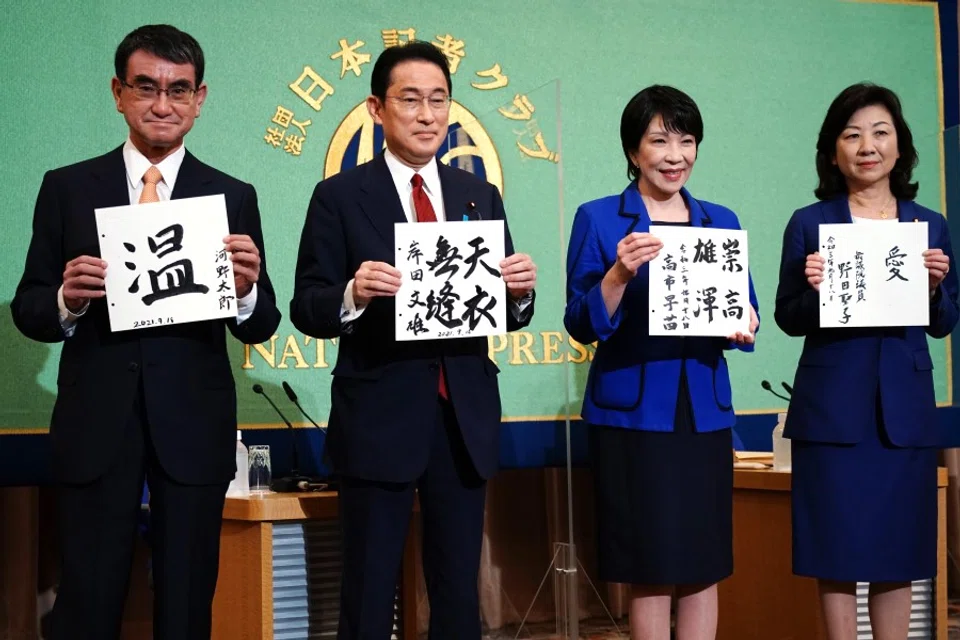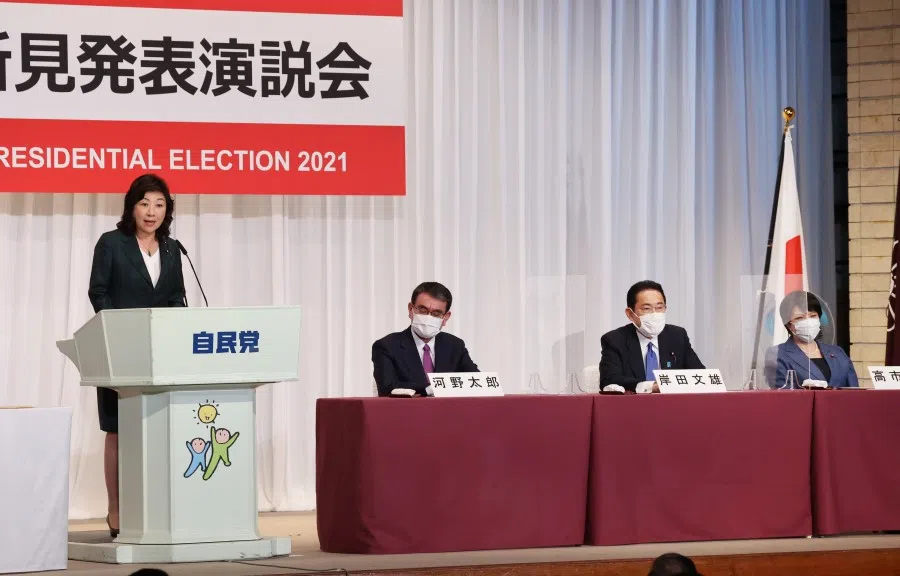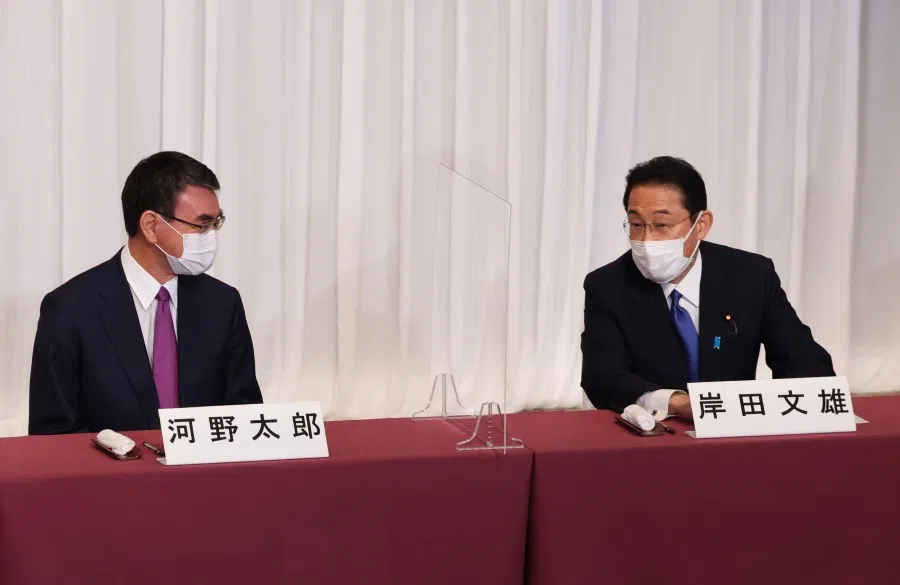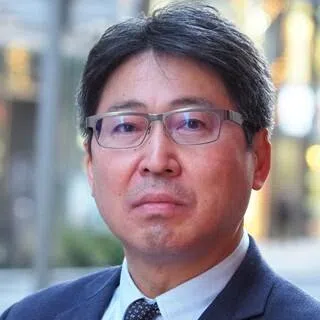How will the Liberal Democratic Party's presidential election affect Japan's China policy?
With Prime Minister Yoshihide Suga stepping down, whoever wins the Liberal Democratic Party leadership race is practically assured of becoming the next prime minister. But with four experienced politicians on the cards, including two women, who will it be? And how will the choice of the next prime minister affect Japan's policy towards China? Japanese academic Shin Kawashima examines the possibilities.

A Liberal Democratic Party of Japan (LDP) presidential election campaign is underway following the decision of Prime Minister Yoshihide Suga, president of the LDP, not to seek re-election. There are four candidates and voting and counting of the votes will take place on 29 September.
The Japanese political system adopts a parliamentary cabinet system. Thus, although the election is for the top leadership of the LDP only, it is crucially important. Since the LDP is the leading party of the ruling coalition, it is difficult to envision a defeat in the lower house general election slated for early November. This makes the LDP presidential election effectively an election to choose the next prime minister. The vote will be divided into voting by Diet members and local LDP chapter members, altogether numbering more than 1.1 million nationwide, with both given approximately equal weight.

The candidates are Fumio Kishida, Taro Kono, Sanae Takaichi and Seiko Noda. All four are seasoned cabinet members, and the latter two are women. The Hosoda faction - which has produced two prime ministers, Shinzo Abe and Suga Yoshihide - is not fielding any candidates and is expected to support either Kishida or Takaichi. However, the Diet members of the faction are expected to vote according to their own views. While the LDP has traditionally had "factions", this time the factions will not coordinate between themselves to decide the LDP president. Rather, it is likely that individual ballots will be cast.
Furthermore, the reason why current LDP president Suga abandoned his candidacy after having originally planned to run in the presidential election is that the reshuffled cabinet led by Suga did not attract any influential members willing to become party leaders, resulting in the LDP's own rallying power declining significantly. It is therefore necessary to recalibrate the Abe/Suga line, rebuild the LDP, and prepare for the coming general election.
Redistribution of wealth and foreign policy will be key topics
In terms of the policies of each of the candidates, aside from Takaichi, who is endorsed by the former president Abe, the other three candidates are trying to adopt a different political agenda from Abe and Suga. A good case in point is Kishida's emphasis on the redistribution of wealth in the economy.
Foreign policy is also attracting attention. Leading candidates Kishida and Kono are the former foreign minister and defence minister of the Abe administration respectively, so it is expected that they will have the requisite diplomatic skills. In particular, policies on China and South Korea are in the spotlight. While Kishida and Kono are able to differentiate themselves from the Abe and Suga administrations in domestic policies, their responsibility for foreign and defence policies in the Abe administration makes them less able to do so when it comes to foreign policies. The key will be whether they can come up with something "new", difficult though it is.
Noda took a positive stance on China's application for CPTPP membership, but Kono said that China is unable to meet the conditions for membership, while Kishida said that he would ascertain whether China fulfills the conditions for membership.
In policies on China too, Kishida and Kono are on the same page, pointing out the importance of dialogue and exchange between the leaders of Japan and China in preparation for the 50th anniversary of the normalisation of diplomatic relations between Japan and China in 2022. At the same time, both take a tough stance on China. For example, Kishida says he will appoint a special adviser to the prime minister in charge of human rights to deal with the issue of the Xinjiang Uygur Autonomous Region.
In the area of security and defence issues, the government says it is ready to prepare new legislation to deal with grey zone issues. More generally, both Kishida and Kono are advocating an emphasis on balance in their foreign policy, but Kono is more moderate. From China's perspective too, Kono would be seen as being tougher on China than his father, former LDP president Yohei Kono. However, of the current candidates, Kono may be seen as relatively more accommodating to China than Kishida.

On the other hand, Noda took a positive stance on China's application for CPTPP membership, but Kono said that China is unable to meet the conditions for membership, while Kishida said that he would ascertain whether China fulfills the conditions for membership. In this sense, while Noda may not be the leading candidate, she may be the easiest for China to handle. It should, however, be noted that Noda has limited practical experience in diplomatic or security policy.
...policy on China has become a focal point in a number of elections around the world and with China now a global power, it is only to be expected that debates about policy on China will erupt. Elections in Japan are no exception.
China's interest in this LDP presidential election is seemingly high. On 14 September, a spokesperson for China's foreign ministry was critical of Takaichi's assertion that she would continue to visit the Yasukuni Shrine if elected, saying of the presidential election that "China's internal affairs brook no foreign interference. Japanese politicians should stop making an issue out of China. Enough with such senseless political hype-up."
However, a government's policy on China has become a focal point in a number of elections around the world and with China now a global power, it is only to be expected that debates about candidates' China policy will erupt. Elections in Japan are no exception. Even leaving aside historical issues, China should not denounce criticism or what it perceives to be misunderstandings as interference from the outside. Rather, as a major power, it should analyse such criticism, respond to it, and act upon it.





